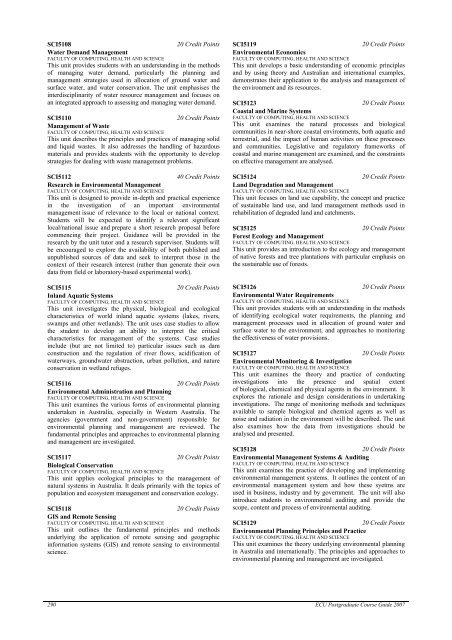Course Guide - Edith Cowan University
Course Guide - Edith Cowan University
Course Guide - Edith Cowan University
Create successful ePaper yourself
Turn your PDF publications into a flip-book with our unique Google optimized e-Paper software.
SCI5108<br />
20 Credit Points<br />
Water Demand Management<br />
FACULTY OF COMPUTING, HEALTH AND SCIENCE<br />
This unit provides students with an understanding in the methods<br />
of managing water demand, particularly the planning and<br />
management strategies used in allocation of ground water and<br />
surface water, and water conservation. The unit emphasises the<br />
interdisciplinarity of water resource management and focuses on<br />
an integrated approach to assessing and managing water demand.<br />
SCI5110<br />
20 Credit Points<br />
Management of Waste<br />
FACULTY OF COMPUTING, HEALTH AND SCIENCE<br />
This unit describes the principles and practices of managing solid<br />
and liquid wastes. It also addresses the handling of hazardous<br />
materials and provides students with the opportunity to develop<br />
strategies for dealing with waste management problems.<br />
SCI5112<br />
40 Credit Points<br />
Research in Environmental Management<br />
FACULTY OF COMPUTING, HEALTH AND SCIENCE<br />
This unit is designed to provide in-depth and practical experience<br />
in the investigation of an important environmental<br />
management issue of relevance to the local or national context.<br />
Students will be expected to identify a relevant significant<br />
local/national issue and prepare a short research proposal before<br />
commencing their project. Guidance will be provided in the<br />
research by the unit tutor and a research supervisor. Students will<br />
be encouraged to explore the availability of both published and<br />
unpublished sources of data and seek to interpret those in the<br />
context of their research interest (rather than generate their own<br />
data from field or laboratory-based experimental work).<br />
SCI5115<br />
20 Credit Points<br />
Inland Aquatic Systems<br />
FACULTY OF COMPUTING, HEALTH AND SCIENCE<br />
This unit investigates the physical, biological and ecological<br />
characteristics of world inland aquatic systems (lakes, rivers,<br />
swamps and other wetlands). The unit uses case studies to allow<br />
the student to develop an ability to interpret the critical<br />
characteristics for management of the systems. Case studies<br />
include (but are not limited to) particular issues such as dam<br />
construction and the regulation of river flows, acidification of<br />
waterways, groundwater abstraction, urban pollution, and nature<br />
conservation in wetland refuges.<br />
SCI5116<br />
20 Credit Points<br />
Environmental Administration and Planning<br />
FACULTY OF COMPUTING, HEALTH AND SCIENCE<br />
This unit examines the various forms of environmental planning<br />
undertaken in Australia, especially in Western Australia. The<br />
agencies (government and non-government) responsible for<br />
environmental planning and management are reviewed. The<br />
fundamental principles and approaches to environmental planning<br />
and management are investigated.<br />
SCI5117<br />
20 Credit Points<br />
Biological Conservation<br />
FACULTY OF COMPUTING, HEALTH AND SCIENCE<br />
This unit applies ecological principles to the management of<br />
natural systems in Australia. It deals primarily with the topics of<br />
population and ecosystem management and conservation ecology.<br />
SCI5118<br />
20 Credit Points<br />
GIS and Remote Sensing<br />
FACULTY OF COMPUTING, HEALTH AND SCIENCE<br />
This unit outlines the fundamental principles and methods<br />
underlying the application of remote sensing and geographic<br />
information systems (GIS) and remote sensing to environmental<br />
science.<br />
SCI5119<br />
20 Credit Points<br />
Environmental Economics<br />
FACULTY OF COMPUTING, HEALTH AND SCIENCE<br />
This unit develops a basic understanding of economic principles<br />
and by using theory and Australian and international examples,<br />
demonstrates their application to the analysis and management of<br />
the environment and its resources.<br />
SCI5123<br />
20 Credit Points<br />
Coastal and Marine Systems<br />
FACULTY OF COMPUTING, HEALTH AND SCIENCE<br />
This unit examines the natural processes and biological<br />
communities in near-shore coastal environments, both aquatic and<br />
terrestrial, and the impact of human activities on these processes<br />
and communities. Legislative and regulatory frameworks of<br />
coastal and marine management are examined, and the constraints<br />
on effective management are analysed.<br />
SCI5124<br />
20 Credit Points<br />
Land Degradation and Management<br />
FACULTY OF COMPUTING, HEALTH AND SCIENCE<br />
This unit focuses on land use capability, the concept and practice<br />
of sustainable land use, and land management methods used in<br />
rehabilitation of degraded land and catchments.<br />
SCI5125<br />
20 Credit Points<br />
Forest Ecology and Management<br />
FACULTY OF COMPUTING, HEALTH AND SCIENCE<br />
This unit provides an introduction to the ecology and management<br />
of native forests and tree plantations with particular emphasis on<br />
the sustainable use of forests.<br />
SCI5126<br />
20 Credit Points<br />
Environmental Water Requirements<br />
FACULTY OF COMPUTING, HEALTH AND SCIENCE<br />
This unit provides students with an understanding in the methods<br />
of identifying ecological water requirements, the planning and<br />
management processes used in allocation of ground water and<br />
surface water to the environment, and approaches to monitoring<br />
the effectiveness of water provisions.<br />
SCI5127<br />
20 Credit Points<br />
Environmental Monitoring & Investigation<br />
FACULTY OF COMPUTING, HEALTH AND SCIENCE<br />
This unit examines the theory and practice of conducting<br />
investigations into the presence and spatial extent<br />
of biological, chemical and physical agents in the environment. It<br />
explores the rationale and design considerations in undertaking<br />
investigations. The range of monitoring methods and techniques<br />
available to sample biological and chemical agents as well as<br />
noise and radiation in the environment will be described. The unit<br />
also examines how the data from investigations should be<br />
analysed and presented.<br />
SCI5128<br />
20 Credit Points<br />
Environmental Management Systems & Auditing<br />
FACULTY OF COMPUTING, HEALTH AND SCIENCE<br />
This unit examines the practice of developing and implementing<br />
environmental management systems. It outlines the content of an<br />
environmental management system and how these syetms are<br />
used in business, industry and by government. The unit will also<br />
introduce students to environmental auditing and provide the<br />
scope, content and process of environmental auditing.<br />
SCI5129<br />
20 Credit Points<br />
Environmental Planning Principles and Practice<br />
FACULTY OF COMPUTING, HEALTH AND SCIENCE<br />
This unit examines the theory underlying environmental planning<br />
in Australia and internationally. The principles and approaches to<br />
environmental planning and management are investigated.<br />
290 ECU Postgraduate <strong>Course</strong> <strong>Guide</strong> 2007



